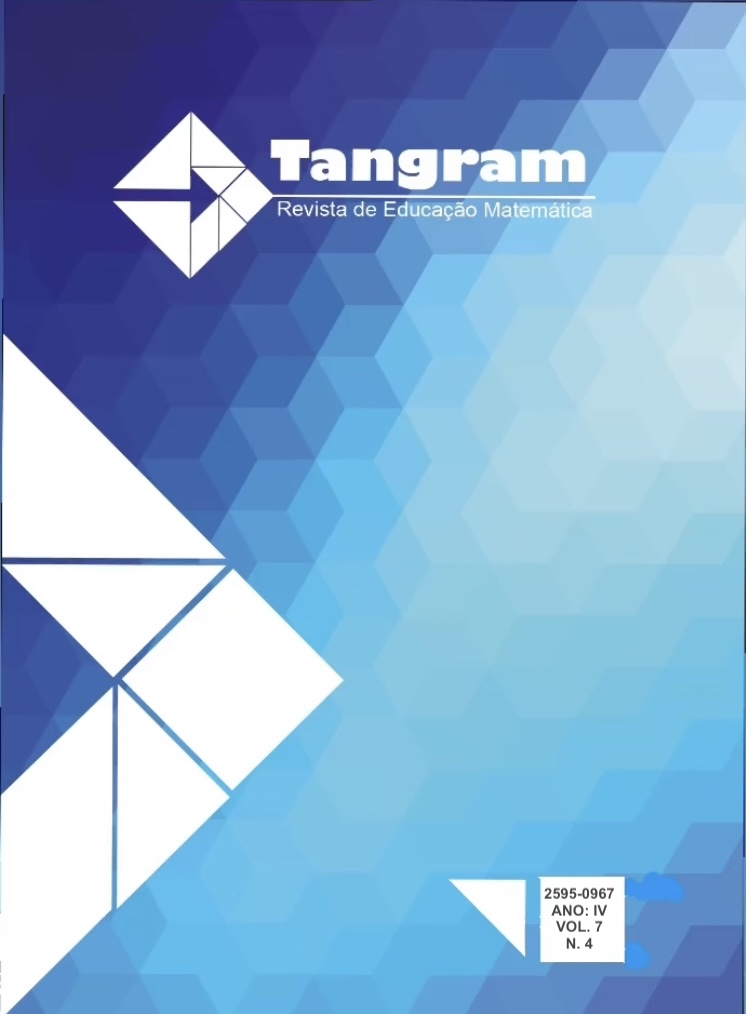Modelagem Matemática e Autonomia: análises das ações de alunos do Ensino Fundamental quando realizam atividades
DOI:
https://doi.org/10.30612/tangram.v7i4.18013Palavras-chave:
Ações de autonomia. Atividades de Modelagem Matemática. Educação Matemática.Resumo
Este artigo apresenta resultados de uma pesquisa, de caráter qualitativo, que tem como intenção investigar quais aspectos de autonomia são suscitados por alunos do Ensino Fundamental enquanto desenvolvem atividades de Modelagem Matemática, tomada na perspectiva da Educação Matemática. Integrada a uma pesquisa maior apoiada pelo CNPq (Conselho Nacional de Desenvolvimento Científico e Tecnológico), os dados foram coletados junto a escolas de uma cidade do oeste do Paraná, mais especificamente, dois quintos anos de duas escolas municipais e um sexto ano de um colégio estadual. Para o tratamento dos dados, utiliza como metodologia a Análise de Conteúdo. Para além da identificação de aspectos de autonomia nas ações dos alunos, destaca, como resultados do estudo, inferências acerca das práticas empreendidas pelos alunos e das possíveis intenções de seus usos, ao que estabelece cinco agrupamentos: solução de “problemas menores” para solucionar a problemática principal; produção de questões que ajudam a pensar e problematizar a atividade; comunicação como modo de validar ou organizar mentalmente uma ideia; engajamento manifestado na preocupação com a realização de experimentos; e autonomia manifestada no planejamento e implementação de encaminhamentos de resolução.
Downloads
Referências
Aguiar, M. K. S. de, & Malheiros, A. P. dos S. (2020). Modelagem matemática e a sala de aula: Um olhar para um material didático. TANGRAM - Revista De Educação Matemática, 3(4), 93–113. DOI: https://doi.org/10.30612/tangram.v3i4.12515
Almeida, L. M. W. (2022). Uma abordagem didático-pedagógica da modelagem matemática. VIDYA, 42(2), 121–145. DOI: https://doi.org/10.37781/vidya.v42i2.4236
Almeida, L. M. W., & Vertuan, R. E. (2011). Discussões sobre “como fazer” modelagem matemática na sala de aula. In L. M. W. Almeida, J. L. Araújo, & E. Bisognin (Eds.), Práticas de modelagem matemática: Relatos de experiências e propostas pedagógicas (pp. 19–44). EDUEL.
Almeida, L. M. W., Silva, K. P., & Vertuan, R. E. (2012). Modelagem matemática na educação básica. Contexto.
Barbosa, J. C. (2003). Modelagem matemática na sala de aula. Perspectiva, 27(98), 65–74.
Bardin, L. (2002). Análise de conteúdo (L. A. Reto & A. Pinheiro, Trads.). Edições 70, LDA.
Benson, P. (2001). Teaching and researching autonomy in language learning. Longman. https://www.taylorfrancis.com/books/9781317862857.
Berbel, N. A. N. (2011). As metodologias ativas e a promoção da autonomia de estudantes. Semina: Ciências Sociais e Humanas, 32(1), 25–40. DOI: https://doi.org/10.5433/1679-0359.2011v32n1p25
Burak, D. (2010). Modelagem matemática sob um olhar de educação matemática e suas implicações para a construção do conhecimento matemático em sala de aula. Revista de Modelagem na Educação Matemática, 1(1), 10–27. DOI: https://doi.org/10.36661/2596-318X.2019v1i1.10740
Chaves, H. V., Filho, O. N. M., & Seixas, P. de S. (2018). Por uma educação para a autonomia de sujeitos situados no mundo. Psicologia da Educação, 46, 81–91.
Freire, P. (1996). Pedagogia da autonomia: Saberes necessários à prática educativa. Paz e Terra.
Klüber, T. E. (2010). Modelagem matemática: Revisitando aspectos que justificam a sua utilização no ensino. In F. B. Brandt, D. Burak, & T. E. Klüber (Eds.), Modelagem matemática: Uma perspectiva para a educação básica (pp. 97–114). Editora UEPG.
Malheiros, A. P. dos S., Souza, L. B., & Forner, R. (2023). Modelagem matemática e Paulo Freire: Um olhar para as articulações nas pesquisas. VIDYA, 43(2), 133–149. DOI: https://doi.org/10.37781/vidya.v43i2.4609
Martin, R. W. S. (2019). Modelagem matemática e autonomia: Um olhar para atividades no ensino fundamental (Dissertação de Mestrado). Universidade Estadual do Oeste do Paraná, Cascavel. https://tede.unioeste.br/bitstream/tede/4717/2/Ronalti%20Martin%202019.pdf.
Medeiros, J., Lübeck, M., Lins, G. S., & Andretti, F. L. (2020). A pedagogia da autonomia e o ensino de matemática. Revista de Educação Popular, 19(2), 258–274. DOI: https://doi.org/10.14393/REP-2020-52201
Sant’Ana, R. B. de. (2009). Autonomia do sujeito: As contribuições teóricas de G. H. Mead. Psicologia: Teoria e Pesquisa, 25(4), 467–477. DOI: https://doi.org/10.1590/S0102-37722009000400002
Schrenk, M. J., & Vertuan, R. E. (2022). Modelagem matemática como prática pedagógica: Uma possível caracterização em educação matemática. Educação Matemática Pesquisa, 24(1), 194–224. DOI: https://doi.org/10.23925/1983-3156.2022v24i1p194-224
Zatti, V. (2007). Autonomia e educação em Immanuel Kant e Paulo Freire. EDIPUCRS.
Downloads
Publicado
Como Citar
Edição
Seção
Licença
Copyright (c) 2024 TANGRAM - Revista de Educação Matemática

Este trabalho é licenciado sob uma licença Creative Commons Attribution-NonCommercial-ShareAlike 3.0 Unported License.
Os autores devem aceitar as normas de publicação ao submeterem a revista, bem como, concordam com os seguintes termos:
(a) O Conselho Editorial se reserva ao direito de efetuar, nos originais, alterações da Língua portuguesa para se manter o padrão culto da língua, respeitando, porém, o estilo dos autores.
(b) Autores mantém os direitos autorais e concedem à revista o direito de primeira publicação, com o trabalho simultaneamente licenciado sob a Atribuição-NãoComercial-CompartilhaIgual 3.0 Brasil (CC BY-NC-SA 3.0 BR) que permite: Compartilhar — copiar e redistribuir o material em qualquer suporte ou formato e Adaptar — remixar, transformar, e criar a partir do material. A CC BY-NC-SA 3.0 BR considera os termos seguintes:
- Atribuição — Você deve dar o crédito apropriado, prover um link para a licença e indicar se mudanças foram feitas. Você deve fazê-lo em qualquer circunstância razoável, mas de nenhuma maneira que sugira que o licenciante apoia você ou o seu uso.
- NãoComercial — Você não pode usar o material para fins comerciais.
- CompartilhaIgual — Se você remixar, transformar, ou criar a partir do material, tem de distribuir as suas contribuições sob a mesma licença que o original.
- Sem restrições adicionais — Você não pode aplicar termos jurídicos ou medidas de caráter tecnológico que restrinjam legalmente outros de fazerem algo que a licença permita.






